Практикум по англ яз ЮС. Новороссийск
 Скачать 0.51 Mb. Скачать 0.51 Mb.
|
|
7. Answer the questions on the text "The Supreme Court of the Russian Federation
8. Choose the right equivalent
9. Match the given phrases
10. Insert the right word 1. The Supreme Court carries out judicial over activities according to the Federal law.
of courts of lower level.
11. Federal Constitutional Law on Judicial System of the Russian Federation Judicial power in the Russian Federation is performed only by courts in the persons of judges and jurors, people's and arbitration assessors drawn in the administration of justice in the order stated by Law. Judicial power is self-dependent and acts inde pendently from legislative and executive powers. Judicial power is performed through constitutional, civil, administrative and criminal court procedure. Judicial system of the Russian Federation is established by the Constitution of the Russian Federation and this Federal Constitutional Law. Unity of judicial system of the Russian Federation is ensured by: establishment of judicial system of the Russian Federation by the Constitution of the Russian Federation and this Federal Constitu tional Law; observance of the rules of court procedure established by federal laws by all federal courts and Justices of the Peace; application of the Constitution of the Russian Federation, federal constitutional laws, federal laws, universally recognized i principles and norms of the international law and international treaties of the Russian Federation, and also constitutions (by-laws) and other laws of the subjects of the Rus sian Federation by all courts; acceptance of compulsory execution of judicial deci sions, which came into legal force, on the whole territory of the Russian Federation; legislative securing of the unity of judicial status; financing of federal courts and Jus tices of the Peace from federal budget. Justice in the Russian Federation shall be administered only by courts established un der the Constitution of the Russian Federation and this Federal Constitutional Law Establishment of extraordinary courts or the courts not mentioned in this Federal Constitutional Law is not allowed. There are federal courts, constitutional (by-laws) courts and Justices of the Peace of the subjects of the Russian Federation functioning in the Russian Federation which compose judicial system of the Russian Federation. Federal courts are: the Constitutional Court of the Russian Federation; the Supreme Court of the Russian Federation, supreme courts of the republics, regional (kraj oblast) courts, city courts of federal importance, autonomous region and autonomous circuits courts, district courts, military and specialized courts, which compose the system of federal courts of general jurisdiction of the Russian Federation; the Su preme Court of Arbitration of the Russian Federation, federal circuit courts of arbitra tion, courts of arbitration of the subjects of the Russian Federation, which compose the system of federal courts of arbitration. The courts of the subjects of the Russian Federation are: constitutional (by-laws) courts of the subjects of the Russian Federation and the Justices of the Peace, which are the judges of general jurisdiction of the subjects of the Russian Federation, - self-dependent - независимый; - court procedure - судопроизводство; - legislative and execu tive powers - исполнительные и законодательные власти; - observance of the rules -соблюдение правил; - compulsory execution - обязательное исполнение; - extraordinary court -чрезвычайный суд; - autonomous circuits courts - автономные окружные суды. 12. Answer the questions on the text "Federal Constitutional Law on Ju dicial System of the Russian Federation"
13. Choose the right equivalent
14. Match the given phrases
15.Text for comprehension. Courts The Constitutional Court of the Russian Federation is the judicial organ of constitu tional control, performing judicial power self-dependently and independently by means of the constitutional court proceedings. The authorities, order of establishment and activities of the Constitutional Court of the Russian Federation are set forth by federal constitutional law. The Supreme Court of the Russian Federation is the highest judicial organ for civil, criminal, administrative and other cases within the competence of the courts of gen eral jurisdiction. The Supreme Court of the Russian Federation carries out supervi sion over activities of the courts of general jurisdiction, including military and spe cialized federal courts in the procedural forms prescribed by federal law. The Supreme Court of the Russian Federation within its competence exercises cassa-tional review as a court of second instance, exercises supervisory powers and acts upon newly discovered evidence, and also, in the cases prescribed by federal law -handles cases as a trial court. District court within its competence handles cases as trial court, exercises cassational review as a court of second instance and exercises other powers provided by federal constitutional law. District court is a direct higher judicial instance for the Justices of the Peace, functioning within the territory of the appropriate judicial district. The au thorities, order of establishment and activities of district court are set forth by federal constitutional law. Military courts are established according to the territorial principle in the places where military troops and fleets are situated, and perform judicial power in the troops, bodies and formations where federal law provides for military service. Mili tary courts within their competence handle cases as trial courts, exercise cassational review as courts of second instance, exercise supervisory powers and act upon newly discovered evidence. The authorities, order of establishment and activities of military courts are set forth by federal constitutional law. The Supreme Court of Arbitration of the Russian Federation is the highest judicial organ solving economic disputes and other cases considered by the courts of arbitra tion. The Supreme Court of Arbitration of the Russian Federation is a direct higher Judicial instance for the federal circuit courts of arbitration and courts of arbitration of the subjects of the Russian Federation. The Supreme Court of Arbitration of the Russian Federation carries out judicial supervision over activities of the courts of ar- bitration in procedural forms prescribed by federal law. Check the comprehension of the text and choose the variant, which you think is correct. 1. The Constitutional Court of the R.F. is the judicial organ of... .
2. The highest judicial organ for civil, criminal, administrative and other cases is...
3. What court handles cases prescribed by federal law as a trial court?
4. District Court is a direct higher judicial instance for the Justice of... .
5. Military courts are established according to....
6. Military courts within their competence are intended to do the following, with the exception of... .
7. What disputes does the Supreme Court of Arbitration solve?
16.Render the Text СУДЕБНАЯ РЕФОРМА В РОССИЙСКОЙ ФЕДЕРАЦИИ За двеннадцатъ лет, прошедшие с момента утверждения Верховным Советом РСФСР Концепции судебной реформы в РСФСР, и девять лет с момента принятия новой Конституции Российской Федерации в судебной системе Российской Федера ции произошли значительные изменения. Заложенные в Концепции судебной реформы от 24 октября 1991 года основ ные направления изменения в сфере судоустройства и отправления правосудия бы ли в основном выполнены. В целях повышения эффективности судебной защиты конституционных правок основных свобод граждан, реализации конституционных принципов формирования и функционирования судебной системы в соответствии с международными стандарта ми необходимо дальнейшее совершенствование судоустройства в Российской Феде рации:
В целях совершенствования взаимодействия ветвей судебной власти, даль нейшего развития, обеспечения нормального функционирования судебной системы в целом и отдельных ее элементов, решения проблем, связанных, в частности, с во просами кадровой политики, финансирования, исполнения судебных решений, вы работкой основных направлений совершенствования правосудия, а также единых правовых позиций правоприменительной практики предлагается создать координи рующий орган. Таким органом может стать Судебная Палата Российской Федерации (далее -СП РФ).В состав СП РФ должны войти по должности председатель и заместитель председателя Конституционного Суда Российской Федерации, председатели и пер вые заместители председателей Верховного Суда Российской Федерации и Высшего Арбитражного Суда Российской Федерации, председатель Высшей квалификацион ной коллегии-судей Российской Федерации, председатель Совета судей Российской Федерации, два представителя Президента Российской Федерации, министр юсти ции Российской Федерации, а также председатели Конституционного Суда Россий ской Федерации, Верховного Суда Российской Федерации и Высшего Арбитражного Суда Российской Федерации, пребывающие в отставке. К функциям СП РФ относятся:
Для реализации этих функций следует подчинить СП РФ Российскую акаде мию правосудия и Службу судебных приставов, а также передать полномочия комис сии Совета по кадровой политике при Президенте Российской Федерации для пред варительного рассмотрения назначения федеральных судей. Необходимость создания названного института, вызвана сложившейся в ны нешних условиях несогласованностью действий ветвей судебной власти в решении общих задач по развитию судебной системы, финансовой и кадровой политики, реа лизации судебных решений, охраны судов и судей и т.п., а также по вопросам взаи модействия с законодательной и исполнительной ветвями власти. В целях совершенствования взаимодействия ветвей судебной власти потребу ется внести необходимые изменения и дополнения в законы Российской Федерации. Unit 5 1. International Law International law (международное право (совокупность норм, с помощью которых государства устанавливают приемлемые стандарты в различных областях взаимоотношений между государственными органами и гражданами разных стран)) is a body of laws, regulations, and accepted practices by which different nations throughout the world interact with each other as well as with their own citizens and citizens of other countries. There are two basic categories of International Law, public International Law and private International Law, although the two tend to overlap frequently. Public International Law deals with relationships between different nations or between a nation and persons from another country. Private International Law generally deals with individual concerns, such as civil or human rights issues, not only between a government and its own citizens but also in how its citizens are treated by other nations. International Law is developed and agreed upon by those that make up the international system, but not every nation state is a member or has a part in the process. Most nations are said to comply with International Law, but that appears questionable considering the number of human rights violations still occurring around the world. While the International community does attempt to hold all nations to International Law, it is not always feasible. Force may be necessary in order to ensure compliance, and the International community is generally against the use of force except in the most dire circumstances. There are also cultural issues that play a part in acceptance of and compliance (соответствие) with International Law. Some nations have a theocratic, or religious, government rather than a secular one and feel more bound to the tenets of their faith than to man-made law. In some cases, what most of the world views as human rights (права человека) violations according to International Law, may be viewed by some nations as acceptable actions or punishments prescribed by religion. This can create very sensitive situations. The United Nations (UN) is probably the most well recognized of all International institutions. It has influence over the world community as a whole as well as individual nations. The UN is supposed to establish and protect peace and cooperation between nations and to ensure that people are treated humanely (гуманно, человечно) by their own as well as by other governments and groups. While many nations have agreed to the UN Charter (Устав ООН), they still retain (сохранять) sovereignty. Few would agree to live completely under UN rule, especially in light of recent scandals and the inability of the institution to achieve its goals. The United Nations has unfortunately been plagued by scandals and perceived incompetence over the years. Critics give the Oil for Food program and the ineffectiveness in protecting human rights in the Rwanda genocide and more recently the Darfur region of Sudan, as examples. As the world seems to grow smaller, with people interacting on a global scale, International Law seems to make sense. However, it must continue to evolve and it must be applied evenhandedly (беспристрастно). It is also necessary for those with the duty to enforce it to be seen as being up to the task. 2. Составьте аннотацию, подготовьте устное сообщение. Международное право представляет собой свод законов, правил и принятой практики, с которой разные страны по всему миру взаимодействуют друг с другом, а также с собственными гражданами и гражданами других стран. Международное право состоит из двух основных категорий - это международное публичное право и международное частное право, но, как правило, они часто перекликаются друг с другом. Международное публичное право имеет дело с взаимоотношениями различных стран между собой и внутри страны в отношениях между нацией и лицами из другой страны. Международное частное право имеет дело с индивидуальными отношениями, такими, как гражданские или вопросы прав человека, а не только между правительством и своими собственными гражданам, но и с теми гражданами, которые находятся на лечении в других странах. Международное право разработано и согласовано теми, кто составляет международную систему, но не каждое национальное государство следует нормам международного права и не является разработчиком международной системы. Большинство стран соглашаются с нормами международного права, но это очень сомнительно, учитывая количество нарушений прав человека, по-прежнему происходящих во всем мире. Международное сообщество делает попытку привести все страны в соответствие с международным правом, но это очень трудно сделать и не всегда это получается. Силы, необходимые для того, чтобы обеспечить соблюдение норм международного права международным сообществом, как правило, не применяются на практике, за исключением самых крайних случаев. Так же есть и культурные вопросы, которые играют определенную роль в принятии и соблюдении международного права. Некоторые страны имеют теократическое или религиозное правительство, это лучше чем светское и при таком правительстве чувствуешь себя более связанными с принципами своей веры, чем при правительстве, основанном на принципе человек - служитель закона. В некоторых случаях то, что большая часть мира признает нарушение прав человека в соответствии с международным правом, может рассматриваться некоторыми странами в качестве приемлемого действия или наказания, предписанных религией. Это может создать очень обостренные ситуации. Организация Объединенных Наций (ООН), вероятно, наиболее хорошо известна из всех международных институтов. Она имеет влияние на мировое сообщество в целом, и на отдельные страны. ООН предполагает установить и защитить мир и сотрудничество между народами, и гарантировать, что с людьми будут обращаться гуманно их правительство, а также правительства других стран и групп. В то время как многие страны согласились с Уставом ООН, они все еще сохраняют свой суверенитет. Мало кто согласится жить полностью в соответствии с правилами ООН, особенно в свете последних скандалов и неспособности учреждения достигать свои цели. Организация Объединенных Наций, к сожалению, страдает от скандалов и воспринимается, как некомпетентная организация на протяжении многих лет. В качестве примера критики приводят тот факт, что нефть дается в обмен на продовольствие, не проводится эффективная работа в деле защиты прав человека в Руанде, геноцид и возмущения в Дарфуре, регионе в Судане. Мир, кажется, становится меньше, и люди взаимодействуют в глобальном масштабе, и международное право имеет смысл быть. Тем не менее, оно должно продолжать развиваться, и оно должно применяться беспристрастно. Это так же необходимо для тех, кто обязан проводить его в жизнь, и на практике будет видно как справляются с данной задачей. Unit 6 Legal Professions in Great Britain Freedom has to be restricted if it is to survive. This is done by the law which prohibits certain actions because they are against the interests of most citizens. But there is no point in having laws unless they can be enforced. Laws are enforced in two ways. First by the Police, whose duty it is to catch offenders. Secondly by the Law Courts which find out whether a person is innocent or guilty. If he is guilty, the courts then award punishment, either a fine or a term of imprisonment. The court system is dependant upon the legal profession to make it work. In Britain the legal profession is divided into two branches, barristers and solicitors. The division has a number of significant impacts upon the judiciary system. The English judiciary system is organised on a very different plan. They have no ministry of Justice. Some of the functions of such a ministry are distributed among members of the Cabinet; to a certain extent the Home Secretary is their minister of criminal justice, and to less extent the Lord Chancellor is their minister of civil justice. The traditional picture of the English lawyer is that the solicitor is the legal adviser of the public. The solicitor may conduct client's case in the lower courts. The barrister can be consulted only through the solicitor; he has the sole right of audience in the higher courts. There is approximately one solicitor to every 1300 of the population, with considerable regional and local variations. There is a heavy concentration in commercial centers. The ratio for barristers is about one per every 10,000. But a lot of work in English solicitors' offices is undertaken by managing clerks, now called "legal executives", who are the third type of lawyers. The judge is the presiding officer of the court. Judges are not themselves a separate profession: they are banisters who have been elevated to the bench, itself a name derived from the part of the Court where they sit. The judge decides the interpretation of the law. The great strength of the British legal system lies in the position of the judges. Once they are appointed it is practically impossible to dismiss them as long as they remain of "good behaviour". The jury system is one of the most distinctive features of British justice. A jury consists of twelve people who are householders, selected at random by the officers of the court. Notice that they are not legal specialists, but simply ordinary men and women who have been ordered to attend. With a few exceptions, juries are seldom employed today in civil cases. In criminal cases involving more than three months' imprisonment, which are not tried by the magistrates' courts, the trial must be by a jury. The professional judges, "High Court Judges", deal with the most serious crimes They are paid salaries by the state But in Britain, the vast majority of judges are unpaid, doing their work voluntarily, and they are called Magistrates or Justices of the Peace (JPs). They are usually well-known local citizens who are selected not because they have any legal training but because they have "sound common sense". They are appointed by the Lord Chancellor. Magistrates are selected by special committees in every town and district. Nobody knows who is on the special committee in their area. The committee tries to draw Magistrates from different professions and social classes. 1. Read the international words and guess their meaning. Mind the stress. system profession individual barrister solicitor characteristic function historical concentration specialist traditional regional interview commercial 2. Find the English equivalents for the words and word-combinations given below. Невиновный, юрист, значительные воздействия, приблизительно, «иконные исполнители», мировой судья, чувство здравого смысла, добровольно. 3. Match English and Russian equivalents
4. Choose the right word or word-combination. 1. The court system is dependent upon the ... a) legal system b) governing body c) legal profession
a) unique b) different c) similar
a) higher b) civil c) lower
a) less serious b) most serious c) unsual
a) solicitors b) legal executives c) barristers 5. Mark the statements that are true.
managing clerks.
6. Answer the following questions.
Unit 7 The History of UN - История Организации Объединенных Наций (ООН) The History of UN The term «United Nations» was coined by Franklin D. Roosevelt during World War II, to refer to the Allies. Its first formal use was in the January 1, 1942 Declaration by the United Nations, which committed the Allies to the principles of the Atlantic Charter and pledged them not to seek a separate peace with the Axis powers. Thereafter, the Allies used the term «United Nations Fighting Forces » to refer to their alliance. The idea for the United Nations was elaborated in declarations signed at the wartime Allied conferences in Moscow, Cairo, and Tehran in 1943. From August to October 1944, representatives of France, the Republic of China, the United Kingdom, the United States, and the USSR met to elaborate the plans in Washington, D.C. Those and later talks produced proposals outlining the purposes of the organization, its membership and organs, as well as arrangements to maintain international peace and security and international economic and social cooperation. These proposals were discussed and debated by governments and private citizens worldwide. On April 25,1945, the United Nations Conference on International Organizations began in San Francisco. In addition to the Governments, a number-of non-government organizations were invited to assist in the drafting of the charter. The 50 nations represented at the conference signed the Charter of the United Nations two months later on June 26. Poland, which was not represented at the conference, but for which a place among the original signatories had been reserved, added its name later, bringing the total of original signatories to 51. The UN came into existence on October 24,1945, after the Charter had been ratified by the five permanent members of the Security Council — Republic of China, France, the Soviet Union, the United Kingdom, and the United States — and by a majority of the other 46 signatories. The United Nations headquarters building was constructed in New York City in 1949 and 1950 beside the East River on land purchased by an 8.5 million dollar donation from John D. Rockefeller, Jr., and designed by architect Oscar Niemeyer. UN headquarters officially opened on January 9, 1951. While the principal headquarters of the UN are in New York, there are major agencies located in Geneva, The Hague, Vienna, Montreal, Bonn. UN membership is open to all peace-loving states that accept the obligations of the UN Charter and, in the judgement of the organization, are able and willing to fulfill these obligations. История Организации Объединенных Наций (ООН) Термин «Организация Объединённых Наций» (ООН) был придуман Франклином Рузвельтом в его обращениях к союзникам . Первое формальное использование этого термина прошло 1 января 1942 года. В декларации Объединенных Наций 1942 года связал союзников с принципами Атлантического договора и обязал их добиться сепаратного мира с государствами Оси. После чего союзники использовали термин «боевые силы Объединенных Наций» в обращении к своим союзникам. Идея Объединенных Наций была выработана в декларациях, подписанных во время войны на конференциях союзников в Москве, Каире и Тегеране в 1943 году. С августа по октябрь 1944 года представители Франции, Республики Китай, Великобритании, США и СССР встретились в Вашингтоне, округ Колумбия, для выработки планов. Эти, а также последующие переговоры и предложения выстроили цели организации, ее органов и членов этой организации, а также договоренности о поддержании мира и безопасности, международного экономического и социального сотрудничества. Данные предложения обсуждались и оспаривались правительствами и частными лицами по всему миру. 25 апреля 1945 года в Сан-Франциско началась конференция ООН. Помимо правительств, были приглашены многочисленные неправительственные организации для выработки Устава ООН. Пятьдесят государств, присутствовавших на конференции, двумя месяцами позже, 26 июня подписали Устав ООН. Польша, не присутствовавшая на конференции, но для которой место среди стран-основательниц было зарезервировано, добавила свое имя позже, доведя, таким образом, число стран — основательниц организации до 51 государства. ООН появилась 24 октября 1945 года после ратификации Устава ООН пятью постоянными членами Совета безопасности — Республика Китая, СССР, Великобритания, Франция и США — и большинством других стран-основательниц. Здание штаб-квартиры ООН было построено в Нью-Йорке в 1949-50 годах возле реки Ист-Ривер на земле, приобретенной за 8,5 миллиона долларов, подаренных Д. Рокфеллером-младшим. Здание было спроектировано архитектором Оскаром Нимейером. Штаб-квартира официально открылась 9 января 1951 года. В то время как главная штаб-квартира ООН находится в Нью-Йорке, есть также основные агентства в Женеве, Гааге, Вене, Монреале, Бонне. Членство в ООН открыто для любой миролюбивой страны, которая принимает требования Устава Организации Объединённых Наций, и по суждению этой организации способна и жаждет выполнять эти обязательства. Questions: 1. Who coined the term « United Nations » ? 2. When was the first formal use of the term «United Nations»? 3. When and where was the United Nations headquarters building constructed? 4. Who donated this construction? 5. Who designed the United Nations headquarters building? 6. How many nations were at the conference in San Francisco in 1945? 7. Why are there 51 founders of the UN instead of 50? 8. What country was not represented at the conference? Vocabulary: term — термин to coin — измышлять, выдумывать, замышлять to refer — приписывать (чему-л.); относить на счёт (чего-л.); иметь отношение, относиться; касаться; ссылаться, опираться (на кого-л./что-л., чьи-л. слова и т. п. — to) the Allies — союзники formal — относящийся к внешней стороне (вопроса, проблемы), формальный; официальный declaration — декларация, заявление to commit — совершать (обычно выходящее за какие-л. рамки действие и т. п.); вверять, поручать; передавать законопроект в парламентскую комиссию principle — принцип Atlantic Charter — зд. Североатлантический договор to pledge — давать торжественное обещание; заверять, обещать, клясться to seek (прош.вр. — sought; прич. прош. вр. — sought)— искать, разыскивать; разузнавать; добиваться, стремиться separate peace — сепаратный мир Axis powers — страны Оси (Германия с союзниками) to elaborate — детально разрабатывать, обдумывать; конкретизировать, развивать, уточнять to sign — подписывать(ся), ставить подпись; одобрить talks — переговоры proposal — предложение; план to outline — нарисовать контур; очертить; обрисовать, наметить в общих чертах purpose — зд. цель arrangement—договоренность, соглашение; разрешение (спора); урегулирование; мн.ч. мера, мероприятие, приготовление to maintain — поддерживать, защищать, отстаивать (закон, теорию, мнение и т. п.); содержать; поддерживать, подкреплять, не дать прекратиться to debate — обсуждать, дискутировать, полемизировать; спорить (about, on, upon — о чём-л.; with — с кем-л.); обдумывать; рассматривать (что-л.); думать (about — о чём-л.), размышлять (над чем-л.) worldwide — общемировой, во всем мире to assist — помогать, содействовать, способствовать, оказывать помощь to draft — писать черновик, делать прикидку, набросок; отбирать, выбирать (предмет из ряда подобных) to reserve — запасать, откладывать, беречь, сберегать, приберегать, сохранять; бронировать, заказывать заранее existence — бытие, жизнь; существование to ratify — ратифицировать; одобрять, санкционировать; утверждать; скреплять (подписью, печатью) permanent — постоянный, неизменный; долговременный; перманентный majority — большинство headquarters — штаб; штаб-квартира to construct — строить, сооружать; воздвигать; конструировать (from/of/out of) beside — рядом с; близ, около to purchase — приобретать, покупать; получать; заслуживать donation — дар, подарок, подношение; денежное пожертвование (to) to design — задумывать, придумывать, разрабатывать; замышлять; намереваться, собираться (сделать что-л.) to locate — определять место, местонахождение; располагать в определенном месте; назначать место (для постройки и т. п.); помещать, размещать to accept — принимать, брать; соглашаться; допускать, признавать; принимать, мириться obligation — гарантия, обязательство; обязанность; долг the UN Charter — Устав ООН judgement — приговор, решение, заключение суда; критика, оценка; осуждение, порицание (of, on, upon); to will — проявлять волю; желать, хотеть; завещать, отказывать, отписывать to fulfill — выполнять; делать, исполнять, осуществлять, совершать; завершать, заканчивать, оканчивать Unit 8 What Is Law? Law is the whole set of rules that are supported by the power of government and that control the behaviour of members of a society. The I i itself provides the basic structure within which commerce and individual operate. It safeguards the rights of individuals, regulates their dealings with others and enforces the duties of government. There are two main kinds of the law - public and private (civil) Private law concerns disputes among citizens within a country, and puMli law concerns disputes between citizens and the state, or between one state and another. The system of law consists of different categories of law. There are laws which enable citizens to take legal action against the state. These actions are part of constitutional law. A constitution is the political and ideological structure within which a system of laws operate. Most countries have a formal written Constitution describing how laws arc № be made and enforced. Many countries face similar social, economic and political problem Nations have always made political and economic treaties with each other International law is created to regulate relations between governments and always between private citizens of one country and those of another. Criminal law deals with wrongful acts harmful to the community and punishable by the state. Civil law deals with individual rights, duties and obligations toward one another. As well as defining the powers of government, most constitution! describe the fundamental rights of citizens. These usually include general declarations about freedom and equality, but, also some specific provision The European Convention on Human Rights (ECHR) was first adopted in 1950 and has now been signed by every country of Western Europe Individual citizens of these countries have the right to bring a complaint before the European Commission if they think their government has broken the Convention. But despite the development of legally binding national and international conventions, millions of people in the world still do not enjoy human rights 1. Guess the meaning of these words. System, control, structure, industry, constitution, individual, regulate, blic, civil, category, legal, political, general, ideological, formal, social, economic, problem, international, criminal, act, fundamental, declaration, pecific, convention, commission, million. 2. Scan the text in order to match these words and phrases with their definitions below. Civil law, criminal law, international law, law, public law, constitutional law.
3. Answer the following questions.
Grammar Active Voice 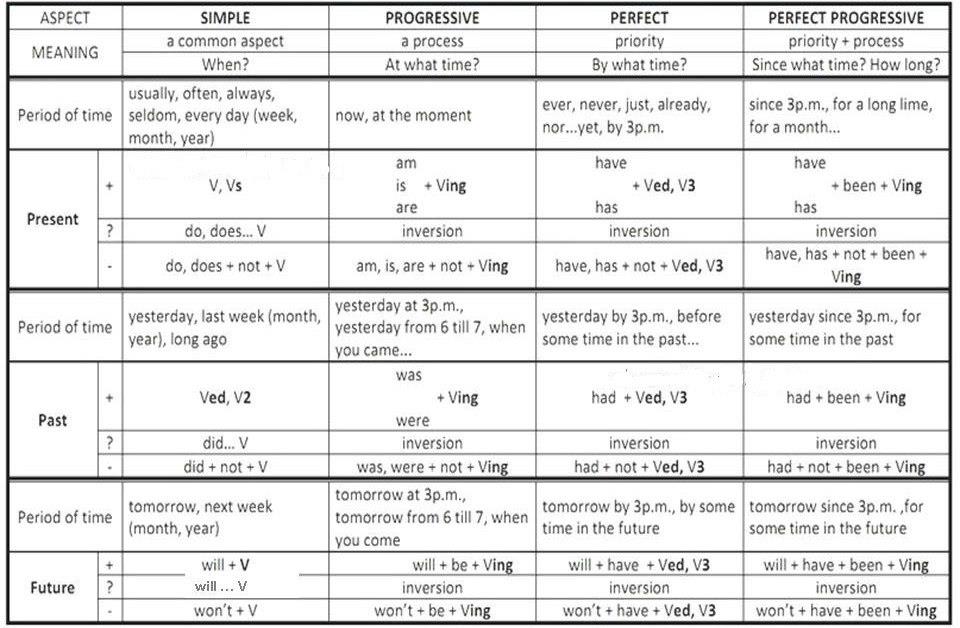 Passive Voice 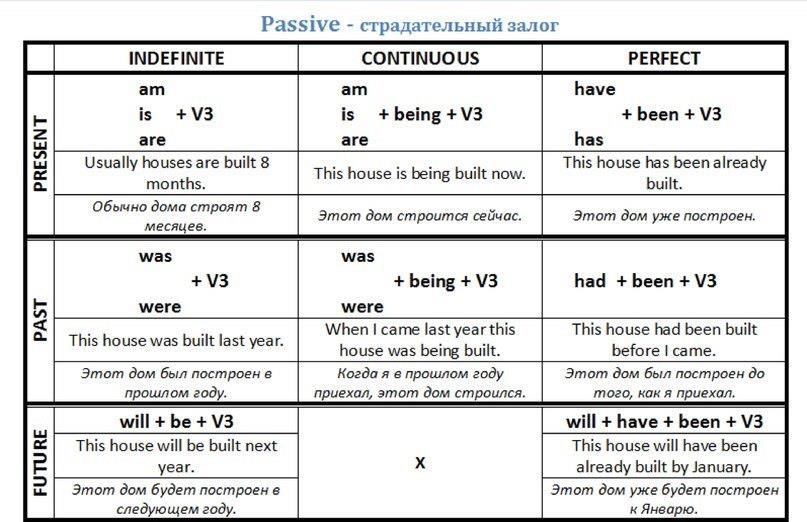 Comparison of Degrees 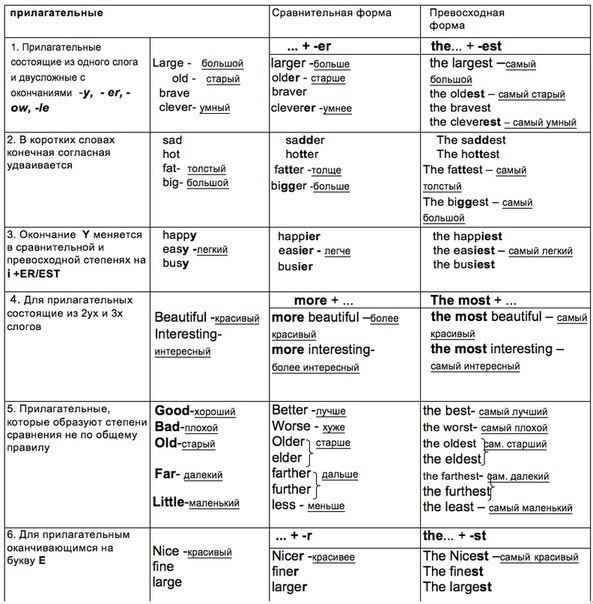 Prepositions 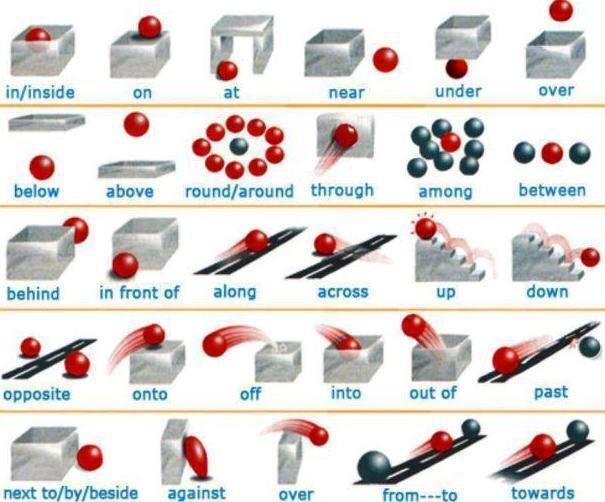 Word Order in the Sentence 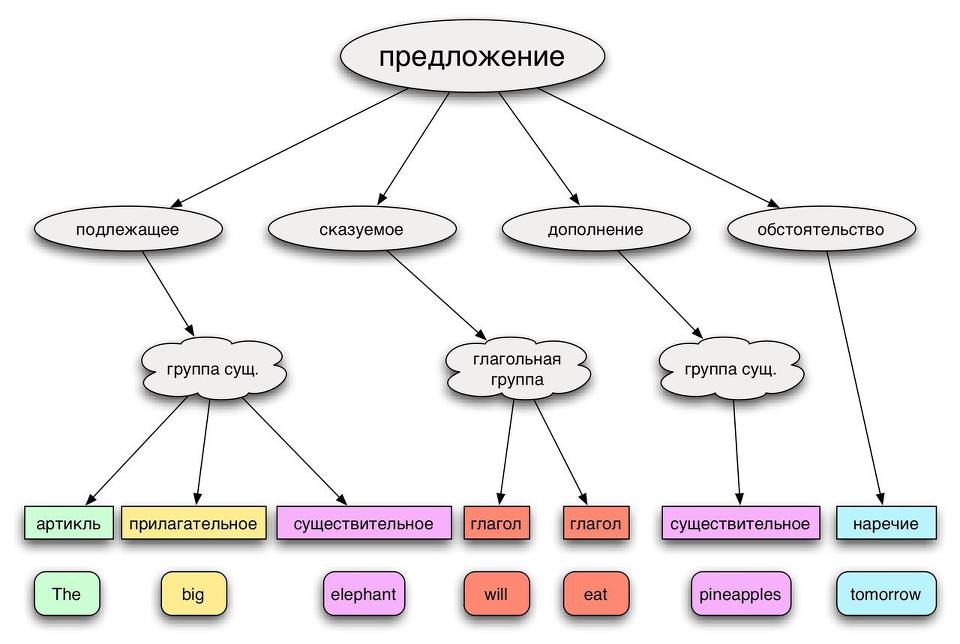 Вопросительные слова и выражения в английском языке:
Склонение глаголов to be, to have ,to do 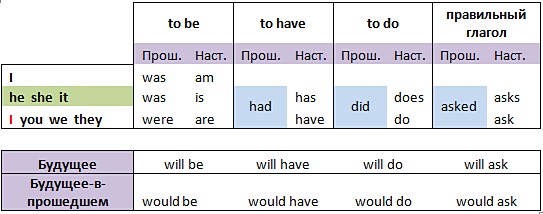 Таблица вопросов в английском языке
|
